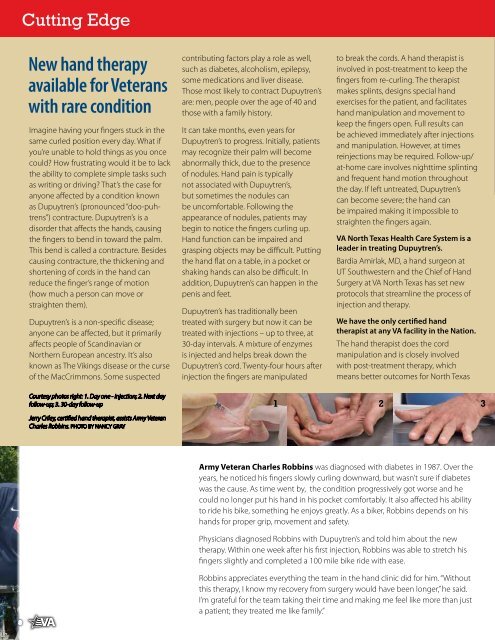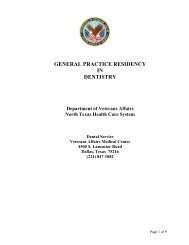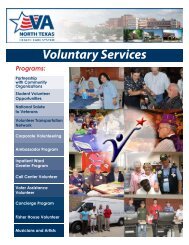Pulse - VA North Texas Health Care System
Pulse - VA North Texas Health Care System
Pulse - VA North Texas Health Care System
You also want an ePaper? Increase the reach of your titles
YUMPU automatically turns print PDFs into web optimized ePapers that Google loves.
Cutting Edge<br />
New hand therapy<br />
available for Veterans<br />
with rare condition<br />
Imagine having your fingers stuck in the<br />
same curled position every day. What if<br />
you’re unable to hold things as you once<br />
could? How frustrating would it be to lack<br />
the ability to complete simple tasks such<br />
as writing or driving? That’s the case for<br />
anyone affected by a condition known<br />
as Dupuytren’s (pronounced “doo-puhtrens”)<br />
contracture. Dupuytren’s is a<br />
disorder that affects the hands, causing<br />
the fingers to bend in toward the palm.<br />
This bend is called a contracture. Besides<br />
causing contracture, the thickening and<br />
shortening of cords in the hand can<br />
reduce the finger’s range of motion<br />
(how much a person can move or<br />
straighten them).<br />
Dupuytren’s is a non-specific disease;<br />
anyone can be affected, but it primarily<br />
affects people of Scandinavian or<br />
<strong>North</strong>ern European ancestry. It’s also<br />
known as The Vikings disease or the curse<br />
of the MacCrimmons. Some suspected<br />
Courtesy photos right: 1. Day one - injection; 2. Next day<br />
follow-up; 3. 30-day follow-up<br />
Jerry Criley, certified hand therapist, assists Army Veteran<br />
Charles Robbins. PHOTO BY NANCY GRAY<br />
contributing factors play a role as well,<br />
such as diabetes, alcoholism, epilepsy,<br />
some medications and liver disease.<br />
Those most likely to contract Dupuytren’s<br />
are: men, people over the age of 40 and<br />
those with a family history.<br />
It can take months, even years for<br />
Dupuytren’s to progress. Initially, patients<br />
may recognize their palm will become<br />
abnormally thick, due to the presence<br />
of nodules. Hand pain is typically<br />
not associated with Dupuytren’s,<br />
but sometimes the nodules can<br />
be uncomfortable. Following the<br />
appearance of nodules, patients may<br />
begin to notice the fingers curling up.<br />
Hand function can be impaired and<br />
grasping objects may be difficult. Putting<br />
the hand flat on a table, in a pocket or<br />
shaking hands can also be difficult. In<br />
addition, Dupuytren’s can happen in the<br />
penis and feet.<br />
Dupuytren’s has traditionally been<br />
treated with surgery but now it can be<br />
treated with injections – up to three, at<br />
30-day intervals. A mixture of enzymes<br />
is injected and helps break down the<br />
Dupuytren’s cord. Twenty-four hours after<br />
injection the fingers are manipulated<br />
to break the cords. A hand therapist is<br />
involved in post-treatment to keep the<br />
fingers from re-curling. The therapist<br />
makes splints, designs special hand<br />
exercises for the patient, and facilitates<br />
hand manipulation and movement to<br />
keep the fingers open. Full results can<br />
be achieved immediately after injections<br />
and manipulation. However, at times<br />
reinjections may be required. Follow-up/<br />
at-home care involves nighttime splinting<br />
and frequent hand motion throughout<br />
the day. If left untreated, Dupuytren’s<br />
can become severe; the hand can<br />
be impaired making it impossible to<br />
straighten the fingers again.<br />
<strong>VA</strong> <strong>North</strong> <strong>Texas</strong> <strong>Health</strong> <strong>Care</strong> <strong>System</strong> is a<br />
leader in treating Dupuytren’s.<br />
Bardia Amirlak, MD, a hand surgeon at<br />
UT Southwestern and the Chief of Hand<br />
Surgery at <strong>VA</strong> <strong>North</strong> <strong>Texas</strong> has set new<br />
protocols that streamline the process of<br />
injection and therapy.<br />
We have the only certified hand<br />
therapist at any <strong>VA</strong> facility in the Nation.<br />
The hand therapist does the cord<br />
manipulation and is closely involved<br />
with post-treatment therapy, which<br />
means better outcomes for <strong>North</strong> <strong>Texas</strong><br />
1 2 3<br />
This team treats Veterans in the Hand Clinic at<br />
Dallas <strong>VA</strong> Medical Center. (left to right)<br />
Jerry Criley, MS, OTR/L, CHT; Bardia Amirlak, MD;<br />
Michelle Horan, PharmD, BCPS and Joan Ballard, RN<br />
PHOTO BY NANCY GRAY<br />
Veterans with Dupuytren’s. To date, more<br />
than 50 Veterans have been treated for<br />
Dupuytren’s at Dallas <strong>VA</strong> Medical Center.<br />
While all results are not the same, most<br />
patients receive ideal relief.<br />
Treatment for Dupuytren’s has a positive<br />
impact on quality of life. Patients can<br />
use their hands again for work and other<br />
daily activities. It means they can get<br />
back to doing things they enjoy. Hobbies<br />
like playing sports or musical instruments<br />
can be accomplished. Before the new<br />
treatment, surgery would be considered<br />
which meant longer recovery and<br />
complications associated with surgery.<br />
In addition, surgery cannot be done on<br />
patients who have health conditions that<br />
put them at risk with general anesthesia.<br />
Treatment for Dupuytren’s can be done<br />
in the clinic with no anesthesia needed.<br />
Million Veteran Program:<br />
A PARTNERSHIP WITH VETERANS<br />
Do you want to help improve the health of future<br />
generations of Veterans and their families? Become a<br />
part of the Million Veteran Program (MVP) today. MVP<br />
aims to be one of the largest studies of genes and<br />
health in the world. The important data collected in this program will be used<br />
by researchers to help improve the prevention, diagnosis and treatment of both<br />
common and military-related illnesses. MVP is enrolling volunteers and seeking<br />
Veterans like you. Volunteering is quick and easy; your participation includes a<br />
short study visit (approximately 20 minutes) and filling out health surveys via<br />
mail. The study visit can also be scheduled on the same day as your next <strong>VA</strong><br />
appointment. Let’s advance the future of healthcare for Veterans. Join thousands<br />
of Veterans who have already become part of MVP. Walk-ins are welcome.<br />
To participate, visit Building 2, Clinical Research located on the 8th Floor at<br />
Dallas <strong>VA</strong> Medical Center to speak to the Research Team: Principle Investigator<br />
Padmashri Rastogi, MD and Research Coordinators Cassie Lusk and Teagan<br />
Johnson. We honor your service and invite you to learn more about MVP.<br />
Call toll-free 866-441-6075 or visit www.research.va.gov/MVP.<br />
<strong>VA</strong> Hotline for Women Veterans<br />
1-855-<strong>VA</strong>-WOMEN (1-855-829-6636)<br />
The Department of Veterans Affairs has a new hotline, 1-855-<strong>VA</strong>-WOMEN, to<br />
receive and respond to questions from Veterans, their families and caregivers<br />
about the many <strong>VA</strong> services and resources available to women Veterans. The<br />
hotline is staffed by knowledgeable <strong>VA</strong> employees who can provide information<br />
about benefits including health care services for women. Callers can be linked<br />
to information on claims, education or health care appointments as well as<br />
information about <strong>VA</strong> cemeteries and memorial benefits. Staff can answer urgent<br />
questions and provide referrals to homeless and mental health services and also<br />
provide Vet Center information.<br />
Army Veteran Charles Robbins was diagnosed with diabetes in 1987. Over the<br />
years, he noticed his fingers slowly curling downward, but wasn’t sure if diabetes<br />
was the cause. As time went by, the condition progressively got worse and he<br />
could no longer put his hand in his pocket comfortably. It also affected his ability<br />
to ride his bike, something he enjoys greatly. As a biker, Robbins depends on his<br />
hands for proper grip, movement and safety.<br />
Women Veterans are entitled to apply for the same benefits as male Veterans,<br />
which include health care and pharmacy benefits, education benefits, disability<br />
compensation, home loans, employment assistance and more. The hotline<br />
(1-855-<strong>VA</strong>-WOMEN) joins numerous other <strong>VA</strong> hotlines that provide critical<br />
information and assistance to Veterans, such as those for Veterans in crisis and in<br />
danger of becoming homeless.<br />
Physicians diagnosed Robbins with Dupuytren’s and told him about the new<br />
therapy. Within one week after his first injection, Robbins was able to stretch his<br />
fingers slightly and completed a 100 mile bike ride with ease.<br />
Robbins appreciates everything the team in the hand clinic did for him. “Without<br />
this therapy, I know my recovery from surgery would have been longer,” he said.<br />
I’m grateful for the team taking their time and making me feel like more than just<br />
a patient; they treated me like family.”<br />
PHOTO COURTESY OF<br />
ARMY VETERAN CHARLES ROBBINS<br />
8<br />
PULSE | AUGUST 2013 9





